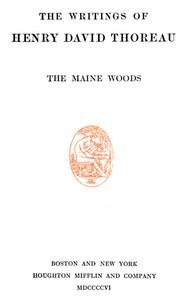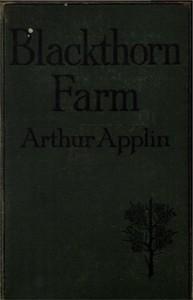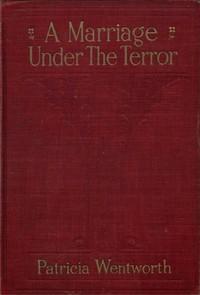|
|
Read this ebook for free! No credit card needed, absolutely nothing to pay.Words: 47102 in 20 pages
This is an ebook sharing website. You can read the uploaded ebooks for free here. No credit cards needed, nothing to pay. If you want to own a digital copy of the ebook, or want to read offline with your favorite ebook-reader, then you can choose to buy and download the ebook.

: The Maine Woods The Writings of Henry David Thoreau Volume 03 (of 20) by Thoreau Henry David - Authors American 19th century Biography; Maine Description and travel; Piscataquis County (Me.) Description and travel; Thoreau Henry David 1817-1862 Travel Mai@FreeBooksWed 07 Jun, 2023 He added now below:-- This was one of his homes. I saw where he had sometimes stretched his moose-hides on the opposite or sunny north side of the river, where there was a narrow meadow. After we had selected a place for our camp, and kindled our fire, almost exactly on the site of the Indian's last camp here, he, looking up, observed, "That tree danger." It was a dead part, more than a foot in diameter, of a large canoe birch, which branched at the ground. This branch, rising thirty feet or more, slanted directly over the spot which we had chosen for our bed. I told him to try it with his axe; but he could not shake it perceptibly, and therefore seemed inclined to disregard it, and my companion expressed his willingness to run the risk. But it seemed to me that we should be fools to lie under it, for though the lower part was firm, the top, for aught we knew, might be just ready to fall, and we should at any rate be very uneasy if the wind arose in the night. It is a common accident for men camping in the woods to be killed by a falling tree. So the camp was moved to the other side of the fire. It was, as usual, a damp and shaggy forest, that Caucomgomoc one, and the most you knew about it was, that on this side it stretched toward the settlements, and on that to still more unfrequented regions. You carried so much topography in your mind always,--and sometimes it seemed to make a considerable difference whether you sat or lay nearer the settlements, or farther off, than your companions,--were the rear or frontier man of the camp. But there is really the same difference between our positions wherever we may be camped, and some are nearer the frontiers on feather-beds in the towns than others on fir twigs in the backwoods. The Indian said that the Umbazookskus, being a dead stream with broad meadows, was a good place for moose, and he frequently came a-hunting here, being out alone three weeks or more from Oldtown. He sometimes, also, went a-hunting to the Seboois Lakes, taking the stage, with his gun and ammunition, axe and blankets, hard-bread and pork, perhaps for a hundred miles of the way, and jumped off at the wildest place on the road, where he was at once at home, and every rod was a tavern-site for him. Then, after a short journey through the woods, he would build a spruce-bark canoe in one day, putting but few ribs into it, that it might be light, and, after doing his hunting with it on the lakes, would return with his furs the same way he had come. Thus you have an Indian availing himself cunningly of the advantages of civilization, without losing any of his woodcraft, but proving himself the more successful hunter for it. This man was very clever and quick to learn anything in his line. Our tent was of a kind new to him; but when he had once seen it pitched, it was surprising how quickly he would find and prepare the pole and forked stakes to pitch it with, cutting and placing them right the first time, though I am sure that the majority of white men would have blundered several times. Now I thought I would observe how he spent his Sunday. While I and my companion were looking about at the trees and river, he went to sleep. Indeed, he improved every opportunity to get a nap, whatever the day. I could trace the outlines of large birches that had fallen long ago, collapsed and rotted and turned to soil, by faint yellowish-green lines of feather-like moss, eighteen inches wide and twenty or thirty feet long, crossed by other similar lines. I heard a night-warbler, wood thrush, kingfisher, tweezer-bird or parti-colored warbler, and a nighthawk. I also heard and saw red squirrels, and heard a bullfrog. The Indian said that he heard a snake. Wild as it was, it was hard for me to get rid of the associations of the settlements. Any steady and monotonous sound, to which I did not distinctly attend, passed for a sound of human industry. The waterfalls which I heard were not without their dams and mills to my imagination; and several times I found that I had been regarding the steady rushing sound of the wind from over the woods beyond the rivers as that of a train of cars,--the cars at Quebec. Our minds anywhere, when left to themselves, are always thus busily drawing conclusions from false premises. My companion, wishing to distinguish between the black and white spruce, asked Polis to show him a twig of the latter, which he did at once, together with the black; indeed, he could distinguish them about as far as he could see them; but as the two twigs appeared very much alike, my companion asked the Indian to point out the difference; whereupon the latter, taking the twigs, instantly remarked, as he passed his hand over them successively in a stroking manner, that the white was rough , but the black smooth . This was an obvious difference, both to sight and touch. However, if I remember rightly, this would not serve to distinguish the white spruce from the light-colored variety of the black. Free books android app tbrJar TBR JAR Read Free books online gutenberg More posts by @FreeBooks
|
Terms of Use Stock Market News! © gutenberg.org.in2025 All Rights reserved.






